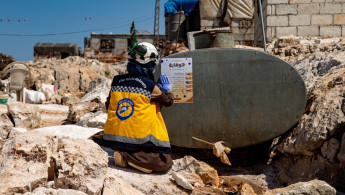With cluster bombs and missiles hitting homes and schools in Ukraine, Russia's horrific assault has been seen before in Syria
Russia's use of internationally banned weaponry in its invasion of Ukraine has been compared by activists and rights groups to Moscow's cruel military tactics in Syria, as the Ukrainian civilian death toll in the war escalates.
Rights groups and officials have accused Moscow of targeting Ukrainian towns and cities with cluster bombs and thermobaric weapons, devices that are intended solely for military targets but have been used by Russia in civilian areas in Syria, and now Ukraine.
Several sources on the ground and investigators from around the world have confirmed that Russia has used cluster bombs during its unprovoked invasion of Ukraine.
Normally air-dropped or launched from the ground, a cluster bomb contains multiple smaller explosives that can completely devastate an area the size of several football fields.
While intended for the battlefield, cluster munitions now "pose an immediate threat to civilians" in Ukraine with the bombs aimed at cities and towns, including schools.
While the weapon has been banned by other 100 countries due to the risks of civilian harm, Russia has not signed the agreement.
Despite Moscow's claims that no civilians are in danger in Ukraine, independent monitors, agencies and rights groups have all pointed to the devastating death toll in urban areas targeted by the Russian onslaught with over 100 civilians dead.
Researchers at the online investigative website Bellingcat have found multiple instances where Russian forces have used cluster bombs around schools and hospitals in Ukraine.
Kharkiv, Ukraine's second-largest city, has reportedly been targeted countless times in such attacks that led to widespread destruction of civilian infrastructure and homes.
Russia has used airstrikes on opposition areas to destroy Syrian civilian infrastructure - such as bakeries and hospitals - and make opposition towns and cities uninhabitable prior to major offensives on the ground.
This same scenario is also being witnessed in Ukraine.
Indications that in the middle of peace talks Russia dropped a bunch of cluster muntions on civilians in Kharkiv. https://t.co/5yxhH3BTaA
— Eliot Higgins (@EliotHiggins) February 28, 2022
Cluster bombs were also dropped near a pre-school in the northeastern Ukrainian town of Okhtyrka in Sumy Oblast, as was detailed in a report by Amnesty International.
"There is no possible justification for dropping cluster munitions in populated areas, let alone near a school," said Agnès Callamard, the Secretary-General of Amnesty International, in response to the bombings.
"This attack bears all the hallmarks of Russia's use of this inherently indiscriminate and internationally-banned weapon, and shows flagrant disregard for civilian life."
The Ukrainian ambassador to the US has also alleged that Russia used a thermobaric bomb in Ukraine, a weapon that sucks oxygen from the surrounding air to ignite a fireball.
The blast lasts significantly longer than a conventional explosive device and can vaporise human bodies near the site.
Russia is no stranger to using banned weapons during military operations. Cluster bombs have been used with devastating effects by Russian forces on Syrian towns, cities and villages, killing and injuring thousands of civilians in opposition areas.
Human Rights Watch (HRW) documented 47 cluster munition attacks in Syria between May and July 2016, one year after Russia entered the war.
In 2019, Moscow reportedly carried out hundreds of attacks each day across Idlib, Hama and Aleppo governorates that killed around 200 civilians, including 20 children.
At the time, Lama Fakih, the acting Middle East director at HRW, said: "The Syrian-Russian military alliance is using a cocktail of internationally banned and indiscriminate weapons on a trapped civilian population."
In 2018, Russian and Syrian regime forces reportedly dropped thermobaric bombs on rebel-held enclaves in Eastern Ghouta leading to immense death and destruction.
The UN Secretary General Antonio Guterres at the time described the residents of the besieged Damascus suburb as living in "hell on earth".
Russia has also blocked efforts by world powers and investigators to hold the Syrian regime to account for the massacre of civilians, including the use of chemical weapons.
The Syria war has seen over 500,000 people killed, mostly civilians as a result of regime attacks on towns and cities.
Must see. Video showing multiple attacks with thermobaric bombs (8 in total) on E. #Ghouta's towns, causing massive blasts (E. #Damascus - #Syria). pic.twitter.com/muRi5PMc9u
— Qalaat Al Mudiq (@QalaatAlMudiq) February 22, 2018





 Follow the Middle East's top stories in English at The New Arab on Google News
Follow the Middle East's top stories in English at The New Arab on Google News


